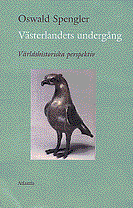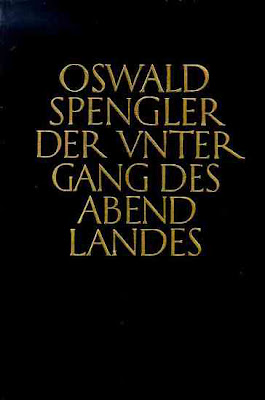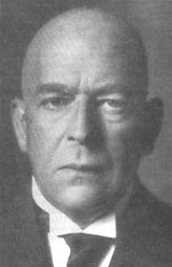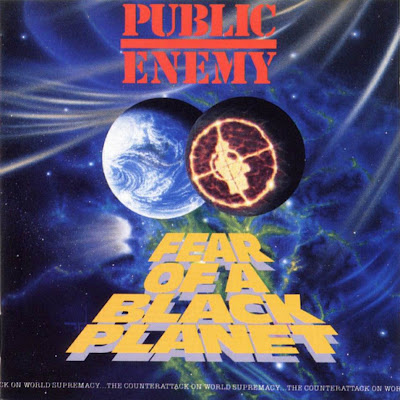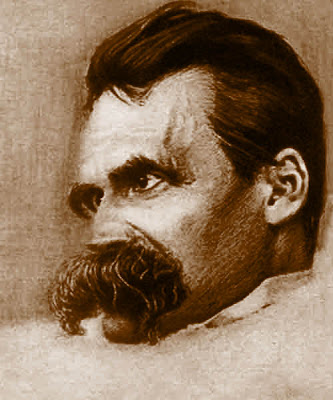>Originally posted July 24, 2007.

I wrote an essay for the Swedish paper Tidningen Kulturen and it was published today. It’s about Spengler again (more about him here), but this time in Swedish. I named it “Här finns inget varaktigt och allmängiltigt – kulturens förfall, enligt Oswald Spengler”.
By coincidence, Dagens Nyheter published an article by Mikael Löfgren today entitled “Vad ska vi ha kulturen till?“. Read that one as well.
But for now, here’s the essay. Enjoy.
Photos shot by me, myself and I in July 2007.
Skanstullsbron, Stockholm.
—
Här finns inget varaktigt och allmängiltigt
Kulturens förfall, enligt Oswald Spengler
Finns det plats för den fria anden i dagens samhälle?
Vårt rotlösa irrande på jakt efter uppmärksamhet, status och bekräftelse – och kanske framför allt jakten på tid för att hinna med jakten (!) – ger svaret nej. Själva tror vi kanske att vi är det bästa som historien kunnat frambringa – en produkt som formats, alltjämt till det bättre, sedan evolutionens begynnelse. För en utomstående torde det västerländska levernet dock te sig allt annat än intelligent.
Och det är vår intelligens som kommer att föra oss ner i avgrunden.
Så trodde Oswald Spengler (1880-1936). Han levde i den tyska turbulenta tid som föranledde politisk, ekonomisk och själslig katastrof, och han var förmodligen väl medveten om vad som stundade. I sitt mest kända verk, Der Untergang des Abendlandes (1918-1922), Västerlandets undergång, utgiven i två volymer, menar han att vi i dag befinner oss i en tid där kulturen – mänsklighetens egenvärde – är på väg att dö ut.
Spengler verkade som filosof och bemöttes kanske just därför med frän kritik från etablerade historiker för sitt nästintill mystiska och måhända flummiga sätt att skildra världshistorien.
Han kritiserade å sin sida historikerna för att de inte ”på allvar studerade övriga civilisationer”, undgick att se parallellerna och det återkommande cykliska, och i stället fokuserade alltför mycket på nutiden och det egenupplevda.
Spengler menade nämligen att det traditionella linjära sättet att se på historien åskådliggör den västerländska egoismen; som vore den västerländska människan ett praktexemplar av all tidigare mänsklig verkan, som om nuläget är det bästa möjliga. Att betrakta mänskligheten som en enda lång utveckling från lågt till högt är dömt att misslyckas. Han skriver:
”Det som fattas hos den västerländska tänkaren och som inte borde fattas hos just honom, är insikten om den historiskt relativa karaktären i hans resultat, som i själva verket är uttryck för en speciell, unik tillvaro. Han borde förstå att det finns nödvändiga gränser för resultatens giltighet och att hans ”eviga sanningar” och ”ovedersägliga insikter” är sanna för honom och hans aspekt på världen. Det borde vara en plikt för honom att söka efter andra insikter, som människor i andra kulturer utvecklat med samma grad av visshet. En framtida filosofi borde ha en sådan fullständighet. Först då skulle man förstå historiens formspråk, den levande världen. Här finns inget varaktigt och allmängiltigt. Allmängiltighet är felslutet att mitt också gäller för andra.”
Spengler uppmanade alltså läsarna att upptäcka och utforska bortom sig själva. Han jämförde själv vilt mellan olika kulturer genom världshistorien för att påvisa likheter och bevisa sina teser.
Enligt Spengler finns det blott åtta högkulturer som stått för den kulturella evolutionen: den babylonska, egyptiska, kinesiska, indiska, mexikanska (Mayakulturen och Aztekerriket), grekisk-romerska, arabiska och västerländska (europeisk-amerikanska). Var och en av dessa högkulturer har bidragit till utvecklingen, och alla har varit lika värdefulla.
Tydlig gemensam nämnare för att styrka Spenglers tes om de åtta högkulturerna: de varar alla i omkring tusen år och följer samma evigt återkommande organiska livscykel. De rymmer således både födsel, blomstring, förfall och död. Det finns ännu inga undantag.
Spengler använde sig av årstiderna för att förtydliga sina resonemang.
Våren innebär kulturens nedkomst. Här formas religionen (bakom varje högkultur finns en värdefull, mentalt samlad religion) och de grundläggande principerna.
Sommaren är kulturens höjdpunkt. Har skapas bestående verk, väsentliga tankar föds och frodas och storslagna prestationer utförs.
Hösten betyder början till slutet. Kulturell förbistring, omfattande katastrofer, massiva människoomflyttningar och oförmågan att kommunicera bidrar till att vintern nalkas. Den fria, intelligenta tanken har resulterat i ateism, ett tänkesätt som försvinner i sinom tid, och i samband med städernas och civilisationens död sker en återgång till den ursprungliga religionen och släktskapet med naturen. Våren kommer alltid igen.
Spengler ser alltså en övergång mellan kulturen och civilisationen. För oss i väst skedde detta någon gång under 1800-talet.
Civilisationen representerar makt, pengar, irreligiositet, en koncentration av intelligensen till staden. Spengler skriver:
”Vad är morgondagens civiliserade politik i motsats till gårdagens kultiverade?”
Och det gäller inte enbart politiken. Även moralen, konsten, kunskapen, vetenskapen och känslolivet har drabbats av civilisationen. Konsten handlar om mode. Vetenskapen finner inga självklara svar. Politiken styrs av pengar. Kulturell förvirring råder. Det är den verkliga början till det verkliga slutet.
Civilisationen är en kulturs oundvikliga öde, då ingenting angår ”folket”. Den så kallade ”demokratin” styrs från städerna av en själlös människomassa, som till skillnad från den kultiverade människan riktar all energi utåt, uppåt, mot något evigt – något som följaktligen är ouppnåeligt. Självförintelse pågår.
De stora städerna utgör spiken i kistan för civilisationen.
Låt oss ta det från början:
Kulturen uppstår på landet. Bonden brukar sin jord – sin jord – och upprättar en själslig, andlig relation till den. Hembygden blir oerhört viktig, något att dö för, då det är det eget skapade som brukas. Bondens hus är ”bofasthetens stora symbol”, ty det har vuxit fram ur den egna marken.
Stadsmentaliteten representeras av en gruppsjäl. ”Det är inte storleken som skiljer staden från byn, utan existensen av en mentalitet”. De civiliserade jättestäderna föraktar bondens själsliga rötter och tar avstånd från lantlivet. I staden talas ett språk som endast talar till ögat och som till slut blir oförståeligt för bonden. Det finns nu två liv: ett utanför staden och ett innanför. Bysmeden lär ha mer gemensamt med bysmeden i andra länder och kulturer än med stadssmeden några kilometer bort.
Denna stadsbildning och distansering är en förutsättning för varje kultur. Alla stora kulturer har nämligen varit stadskulturer.
De tidiga byarna har samma sorts närhet till jorden. De följer landskapsbilden med kullar, ängar och vattendrag. De lantliga småstäderna bekräftar landsbygden, låter pyramiderna och katedralerna växa ur marken. Storstäderna vill vara något annat, något mäktigare. De trotsar naturen, förnekar den. De strävar uppåt och utåt, absorberar landskapet och kräver sitt utrymme i form av breda huvudvägar i stället för slingriga landsvägar, parker i stället för skogar och fontäner i stället för källor och så vidare. Det är konstgjort och själlöst. Stadsmänniskan blir därefter. Den har höjt sig över bondebefolkningen och dikterar nu reglerna. ”Antikens forum och den västerländska pressen är i hög grad andliga maktmedel för den härskande staden”. Stadsmänniskorna, som föraktar hela sin kulturs moderslandskap, bor nu i en världsstad som inte längre behöver hävda sig mot landsbygden. De är lika beroende av penningtänkandet som bonden förr var beroende av jorden. Imperialismen är slutepokens givna symbol.
Men det hemska slutar inte där. Spengler talar även om avfolkningen. Staden befolkas av intelligenta människor, och han menar att det är intelligenserna i varje kultur som utgör de ”sista” människorna. Han talar om den civiliserade människans ofruktsamhet:
”Storstädernas sista människor vill inte leva längre, möjligen kanske som enskilda individer, men inte som typ, som massa; där slocknar rädslan för döden. Det som fyller den äkta bonden med en djup och oförklarlig ångest, tanken på familjens och namnets utdöende, har förlorat sin mening. … Barnen uteblir, inte bara för att de blivit överflödiga, utan för att den skärpta intelligensen inte hittar några skäl för dess existens.”
Och det som är bundet till ”stenen och intellektet” går sakta men säkert under.
Spengler skriver emellertid, krasst konstaterande men ändå hoppfullt, att:
”Bonden är den eviga människan, oavhängig all kultur som tagit plats i städerna. Han finns före den, han överlever den, sturigt avlande nya släktled, inskränkande sig till jordbundna sysselsättningar och färdigheter, med en mystisk själ och ett torrt, till det praktiska bundet förstånd, basen för och den ständigt flytande källan till det blod som skapar världshistoria i städerna.”
Kjell Ahlinge, radioveteran med programmet Eldorado i P2 som ständig ledsagare, fick nyligen frågan ”Är kulturvärlden väldigt trångsynt egentligen?” av riotbrain.se. Hans svar löd:
– Det är mycket roligare att prata med frisörer och snickare än med dem som kommit långt i kulturvärlden.
Och det är så långt vi har kommit. Vi bevittnar kulturens dödsryckningar.
Här finns inget varaktigt och allmängiltigt.
Mattias Indy Pettersson
—
Published in Tidningen Kulturen #22/2007, July 24th
